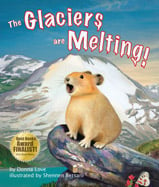Alignment to Standards for OK

| Grade | Number | Standard |
|---|---|---|
| 1 | SC-1)1:3. | Water can be a liquid or a solid, and can be made to go back and forth from one form to the other. |
| 1 | SS-1)5.1. | Describe how people get their basic needs of food, clothing, and shelter (e.g., make/grow their own, trade with others for what they need, and earn money to buy the things they need). |
| 2 | SC-2)1:1. | Objects can be described in terms of the materials of which they are made. Physical properties of materials can be changed by tearing, sifting, sanding, or pounding. |
| 2 | SC-2)3:1. | Earth materials can be used as resources (e.g., building materials and for growing plants). |
| 2 | SS-2)2.4. | Identify basic landforms and bodies of water (e.g., plains, mountains, rivers, and gulfs), the four oceans, the seven continents, human-made features (e.g., roads and towns). |
| 3 | SC-3)2:1. | Plants and animals have features (i.e., breathing structures, limbs, skin covering, seed dispersal, roots, stems, and leaves) that help them live in environments such as air, water, or land. |
| 3 | SC-3)2:2. | Each plant or animal has different structures that serve different functions in growth and survival (i.e., the way it moves, type of food it needs, and where it lives). |
| 3 | SS-3)4.2. | Locate and distinguish among varying landforms and geographic features (e.g., mountains, plateaus, islands, and oceans). |
| 4 | SC-4)3:1. | Organisms can survive only in environments in which their needs can be met. |
| 4 | SC-4)3:2. | Living organisms can be classified using various characteristics (e.g., habitats, anatomy, behaviors). |
| 4 | SC-4)3:3. | Many observable characteristics of an organism, such as the color of flowers or the number of limbs on an animal, are inherited from the parents of the organisms. |
| 4 | SC-4)4:1. | The processes of erosion, weathering, and sedimentation affect Earth materials |
| 4 | SS-4)3.3. | Analyze how the major physical features (e.g., landforms and bodies of water) were formed and continue to change. |
| 5 | SC-5)2:1. | Organisms depend on each other for food, shelter, and reproduction. |
| 5 | SC-5)2:2. | Changes in environmental conditions due to human interactions or natural phenomena can affect the survival of individual organisms and/or entire species. |
| 5 | SC5)4:1. | Interpret pictures, simple bar graphs, and/or tables. |
| K | SC-K)2.3. | Observe and describe how animals move (e.g., walk, crawl, hop, fly). |
| K | SC-K)3.1. | properties of common earth materials (e.g., soil, rocks, water). |
| K | SC-K)3.4. | Describe simple conservation measures used to protect the environment (e.g., recycling, careful use of water). |
| PK | SC-PK)3.3. | an interest and respect for the plant and animal life around them. |
| PK | SC-PK)4.1. | Develops an awareness of the properties of common earth materials (e.g., soil, rocks, water). |
| PK | SC-PK)4.4. | Observes and participates in a variety of activities related to preserving the environment. |